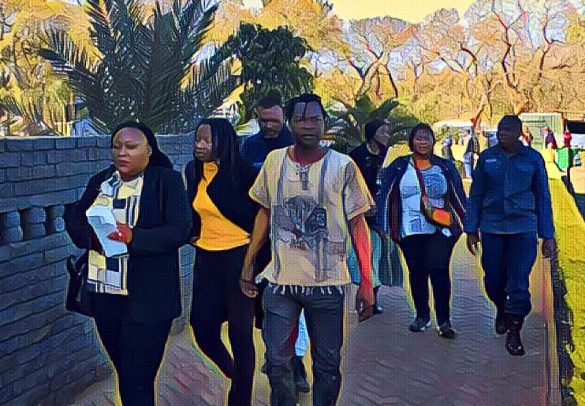Three human rights defenders, Robson Chere, Namatai Kwekweza, and Samuel Gwenzi, have been denied bail by Magistrate Ruth Moyo in a case that has garnered significant attention. The trio, who were arrested on July 31 while attempting to board a plane to Victoria Falls, are accused of disorderly conduct and staging a protest at the Harare Magistrates Court. The protest demanded the release of Jameson Timba, the interim leader of the Citizens Coalition for Change (CCC), along with other opposition activists who are currently detained.
Magistrate Moyo ruled against granting bail, citing concerns that the defendants might reoffend if released. She referenced the fact that some of their accomplices had evaded arrest as justification for keeping them in custody. The Magistrate expressed concern that the defendants could regroup with their accomplices and continue their protest activities, which she argued posed a significant risk of reoffending.
Concerns Over Public Safety and Legal Justifications
In her ruling, Magistrate Moyo stated that the State had provided sufficient grounds to deny bail. She emphasized that the likelihood of the defendants reoffending, coupled with their previous attempts to evade arrest, justified their continued detention while awaiting trial. This decision highlights the ongoing tensions between human rights activists and the state, particularly in cases involving high-profile opposition figures.
The charges against Chere, Kwekweza, and Gwenzi stem from their involvement in a protest that sought to challenge the ongoing detention of CCC leader Jameson Timba and other opposition activists. The protest, which took place at the Harare Magistrates Court, was deemed by authorities to be a direct challenge to the state, leading to the swift arrest of the three activists.
Implications for Human Rights and Legal Processes
The denial of bail in this case has sparked a debate over the balance between public safety and the rights of individuals to protest and express dissent. Human rights organizations have raised concerns that the continued detention of these activists without bail could be seen as a tactic to suppress dissent and silence opposition voices. The legal community is closely watching this case, as it could set a precedent for how similar cases are handled in the future.
Magistrate Moyo’s ruling reflects the state’s stance on maintaining order and preventing potential disruptions. However, it also raises questions about the fairness of the legal process and the treatment of those who engage in peaceful protest. As the case moves forward, it is likely to attract further scrutiny from both domestic and international observers.
The broader implications of this case are significant, as it touches on the right to protest, freedom of expression, and the state’s response to dissent. The decision to deny bail may be seen as an attempt to deter similar actions by other activists, but it also risks fueling further tensions between the state and those advocating for human rights and political reform.
As the defendants prepare for trial, the legal arguments surrounding their case will be crucial in determining the outcome. The ruling on their bail application has already set the tone for what is expected to be a highly contentious legal battle. The outcome of this case could have lasting effects on the legal landscape in Zimbabwe, particularly concerning the rights of activists and the state’s approach to managing dissent.
Source: New Zimbabwe


